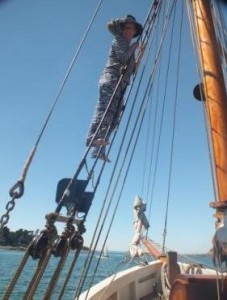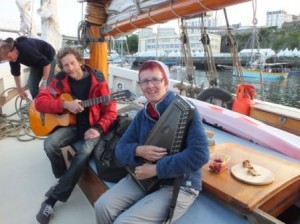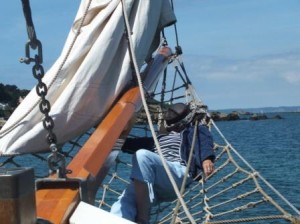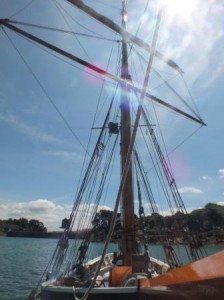Shipshape schooners and perfect proposals
At the beginning of July I hitched a ride to Brittany on a Welsh schooner, came back on a Cornish lugger and enjoyed three festivals of sail along the way…. but more about that another time.
Time to come back down to earth……
My adventures are over for the time being and I’m in sunny Cornwall. I washed the salt out of my hair, packed away my lifejacket and got diverted from the tedious business of booking a coach or two back to Suffolk by noticing that Penzance was hosting a Literary Festival. What a delight – I had time to attend just one session and opted for a talk on non-fiction.
So this is a brief diversion for the benefit of all my clever writerly friends. If you’re waiting for the sailing blog posts, just look at the pictures this time while I do a quick update of the main points of the talk, and I promise to catch up on some nautical adventures next post….
HOW TO WRITE A NON-FICTION BOOK PROPOSAL
by Colin Midson, former non-fiction commissioning editor at Simon & Schuster
What’s a non-fiction proposal for? To grab the interest of an agent or publisher of course, but for the writer’s benefit too, to get a handle on the overall structure and shape of the subject. This is a very potted summary of Colin’s thorough and excellent advice on how to put it all together – if I don’t do it justice the fault is all mine!
1. MAKE your proposal substantial, not just thrown together. Preferably work on it after you’re already several chapters in to the book so that you have something concrete and can see the shape of it. A non-fiction book is commissioned on the promise of those early chapters and could be cancelled if the book doesn’t deliver its promise.
2. DON’T start with a summary: “This book is about……”. Just because it’s a proposal it shouldn’t be dull – get your good stuff up front first. Start with the best and most exciting, and if you don’t know which bits are best, record yourself telling someone else all about it – painful but useful!
Make your proposal exciting….. but not necessarily as scary as threading several hundred boats through this gap in the rocks on the Parade of Sail to Douarnenez….
3. THEN – come in with what the book is about, all the practical info. Try and come up with a great one line hook about why this book really needs to be published.
4. DON’T bang on about how the book should be marketed – the publisher knows far more about that than you do. Stick to comparisons – ie. “This is a book that would appeal to readers of…..” which is enough to help them get a feel for its potential. Make a study of similar books that are out there; list them, summarise them and then say how your idea is better/different/similar. This addresses the basic question of ‘Who is going to read this book?’
5. DO put in background information about yourself but only if it’s relevant – and if you do a blog, mention that too. If listing all your accomplishments makes you feel a little queasy, write it in the third person.
6. DO put in a table of contents. In fact, put in two – first of all, the contents of the proposal, so that it all makes sense and you’re free to deliver the exciting bit first without causing confusion. Then later put in detailed contents of the book itself, with a bit of a summary by each chapter. All part of making your proposal solid and well thought out.
Shipshape and working towards perfect pitch??
7. DO include sample chapters – and go for the best! First chapter is good as you want the first to be attention-grabbing, and then a well chosen selection of any others. Go for at least three chapters, possibly more.
8. FINALLY – check and edit your proposal thoroughly. Put it away for a couple of weeks then look at it afresh. Lay it out clean and clear and package it in a way that’s going to make reading as pleasant and easy as possible for the overworked agent at the other end.
There was much more of course, but I’ll stick to the basics – time to get back to the studio and give my own ideas a bit of the Midson zing! And oh, I do wish there was a better word for non-fiction. It makes it sound like the poor relation of fiction and it’s not – it’s just different and just as important to be written well.
See, I wasn’t really on holiday, I was doing essential research for my book of sea stories.
I’ll be back soon with tales of derring do on the high seas and harbourside bars of Brittany, but in the meantime, look – here’s the sun over two yardarms! Here’s to new adventures, whether physical or imaginary.
‘Vilma’ anchored off Treboul in Brittany. It was tough out there!






Great advice thanks!